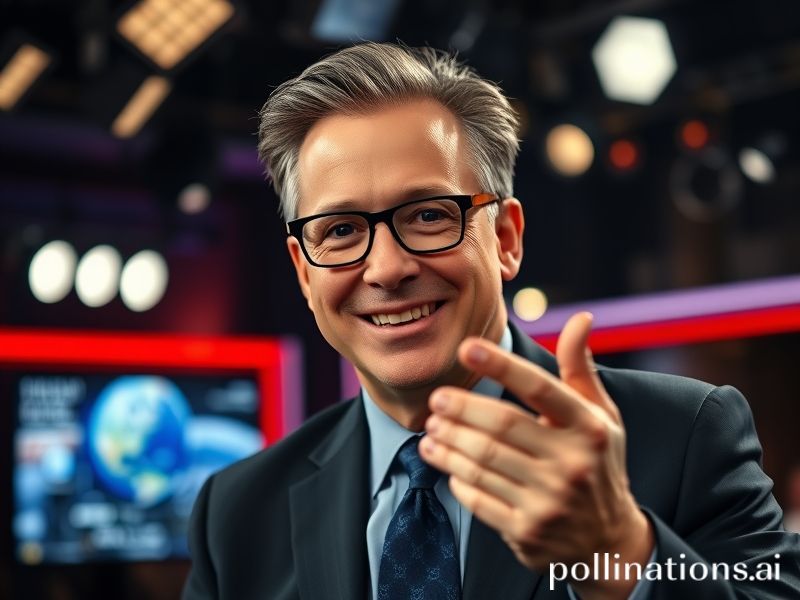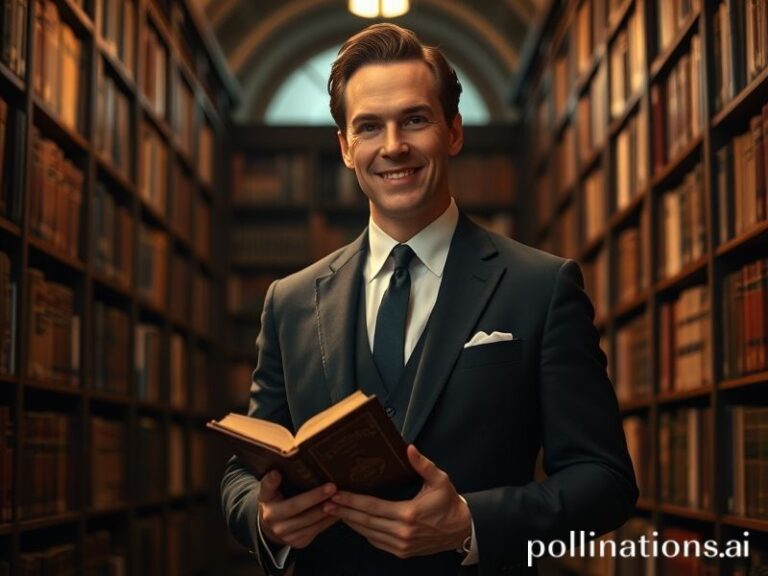Gutfeld Goes Global: How One Man’s Sarcasm Became America’s Cheapest Soft-Power Export
The Curious Export of Greg Gutfeld: How America’s Snarkiest Late-Night Host Became a Global Rorschach Test
PARIS—On a rain-slick Wednesday in the Marais, the barman at Le Mary Celeste muted France-Inter mid-interview with Emmanuel Macron and flicked on the subtitled feed of “Gutfeld!” The move drew zero protests; the patrons—mostly advertising strategists pretending to read Le Monde Diplomatique—quietly assumed their usual ironic slouch. Half an hour later, an Australian backpacker asked if this was “that American who roasts CNN more than the French roast their coffee.” In that moment, Greg Gutfeld, 59, ceased being merely a Fox News curiosity and became a floating signifier: part carnival barker, part cultural litmus test, all beamed from a studio on Sixth Avenue to flat-screens from Reykjavik to Riyadh.
To understand why a libertarian ex-magazine editor turned late-night jester now matters in places where people still debate whether David Letterman was ever funny, one must first accept an ugly truth: the United States’ most successful export after Marvel films and calorie counts is its capacity to monetize contempt. Gutfeld’s program—equal parts bar-stool rant, dorm-room bull session, and hostage video—has quietly become the States’ cheapest soft-power weapon, delivering a pre-chewed narrative that “the elites” (whoever they are this week) are both omnipotent and incompetent. It’s an argument so globally portable that even the Singaporean finance minister referenced it last year while explaining why “experts” failed to predict crypto contagion.
Overseas, reactions split along predictable lines. In Warsaw, the ruling coalition’s youth wing binge the show on Telegram clips, thrilled to discover an American who openly despises American media. In Seoul, marketing agencies study Gutfeld’s ratings surge—he now outdraws both Stephen Colbert and Jimmy Fallon in the 25-54 demo—as proof that irony-poisoned millennials will trade earnest monologues for smirking nihilism if you serve it fast enough. Meanwhile, in the Berlin newsroom of Deutsche Welle, editors run periodic explainers titled “Warum lacht Amerika über seine eigenen Apokalypse?” (“Why is America laughing at its own apocalypse?”), illustrated by a cartoon bald eagle wearing aviators and holding a Molotov latte.
The economics are brutal and borderless. Each thirty-minute episode costs roughly one-tenth of a John Oliver deep-dive—no foreign bureaus, no on-location stunts, just four folding chairs and the collective trauma of the American experiment. That low overhead translates into tidy licensing deals: Gutfeld’s clips now appear on Sky News Australia, India’s WION, and, through a dubiously legal YouTube pipeline, on Chinese social media where netizens use them as English-practice fodder. The irony isn’t lost on Beijing’s censors: a show that lambasts “globalist technocrats” is itself a globalized piece of techno-content, optimized for maximum bile-per-pixel.
Critics, of course, point out that exporting performative grievance is hardly new; the Romans charged admission to watch Christians become lion chow. What’s novel is the algorithmic tailwind. Twitter’s rage-retweet economy turbocharges Gutfeld’s greatest hits—usually a 45-second clip of him comparing climate activists to “an IKEA instruction manual written by Satan”—across borders before fact-checkers finish their morning espresso. The result is a planetary feedback loop: foreign outrage fuels domestic ratings, which in turn finance more outrage, now with improved international subtitles. Call it the globalization of sneer.
Yet for all the sound and fury, the show’s deeper significance may be its accidental honesty. Strip away the mugging and the monologue about Biden’s teleprompter resembling “a hostage letter from a Speak & Spell,” and you’re left with a confession: large swaths of the United States no longer believe their institutions can solve anything. Broadcasting that doubt worldwide isn’t subversion; it’s free-market realism. When a Bolivian lithium miner sees Gutfeld mock the SEC’s latest crypto ruling, he isn’t just entertained—he receives confirmation that the empire is too busy arguing with itself to notice the periphery renegotiating every supply chain.
Back at Le Mary Celeste, the bartender finally turned the volume down. Outside, a poster advertised the upcoming Paris Olympics under the slogan “Games Wide Open.” One patron muttered, in perfect California English, “Sounds like a Gutfeld punchline waiting to happen.” No one disagreed. In the end, the host’s greatest export isn’t conservatism, libertarianism, or even cynicism—it’s the comforting assurance that, somewhere across the ocean, the circus is always in town and the popcorn is bottomless.







